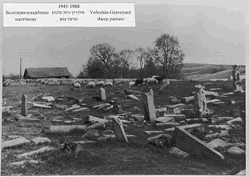
Reb Itshe der Balegole (the coachman)
by Reuven Rogovin
Volozhin Izkor book page 508 (code 72.3)
Translated from Hebrew by M. Porat
Reb Itshe owned a horse and an enclosed cart, in which he used to transport passengers from Volozhin to the nearest rail station; originally it was the Malodetshno station, then to Listopad, Horod’k and just before the war started to the newly opened Volozhin rail station. The street, which he resided on, was called "Tsarskiy Dvoretz" ("The Tsar’s estate" –Russian). It was named so in ironic figure of speech, actually a swampy mud covered the humble narrow lane. Without the improvised solution of planks passageway it would have been impossible to reach Reb Itshe’s house during the winter.
In the klayzl (small synagogue) a group of old Jews would usually study intently. Each Shabes after the Minhe (afternoon) prayer they used to read the Psalms book, beginning from the 119th "Ashrey" Chapter "Blessed should be the righteous, which follows God ways" and until the end of the entire book. And if the Mayriv (evening) prayer time still did not arrive they would begin anew from "Ashrey".
The eldest member of the study group was Reb Moyshe Shmuel Guirzon, an old Jew with a long white-beard, who used to end each Psalms Chapter with a pleasant melody. Among the participants were also his three sons – Fayve, Yehoyshua and Mates (from this family only one survived – Yaakov Guirzon, Mates’s son who now lives in Israel). The other participants were Mihl Gavriel der Stolar (Carpenter) , R’ Moyshe Smuel’s brother, Itskhok Guetsl der Shuster (cobbler), Avrom Itshe der Katsev (butcher) , Itshe der Balegole (coachman), Perets der Balegole, Moyshe der Shnayder (tailor), Shmuel Itshe der Guenzler (Goose man) and others.
While Reb Moyshe Shmuel would start to read with his pleasant melody Ashrey – Blessed should… all participators used to pull out their glasses from the pockets. Every pair of spectacles they owned would be highly distorted, one set would have broken lens, another was without a grip, a third one was fixed with a bandage and the fourth was completely unsuitable to be used. Each set of spectacles had a kind of prosthesis; only Reb Itshe‘s glasses were more or less in order.
Reb Itshe used to read his Tehilim (Psalms) chapters with unique emotion and sweetness. For the reason that, he, Itshe the coachman, a simple Jew with his own expression, could thank and praise the Almighty Universe Creator. And when Reb Moyshe Shmuel would begin to read, "Water Rivers flew from my eyes, because they did not guard your holy Torah…" (Psalms, chapters 119, 136), Reb Itshe would take out from his capote pockets a huge red handkerchief to wipe his tears.
After my wedding I continued to do my prayers in this Klayzl. Opposite to me sat Reb Itshe der Balagole. On his right sat R’ Berl Potashnik and to his left – R’ Moyshe Shloyme der Melamed and Baal Koyre (the Teacher & Prayers reader).
Reb Itshe’s stander (unit to lean on it when praying) was in similar state as the glasses of the Tehilim group members. Nevertheless he never repaired it in the same way as he did not mend his glasses.
At the honored East wall sat the most important Balabatim. Among them were Harav Naftali Hertz Eskind (he served as Volozhin Rabbi after Reb Refoel Shapiro’s departure to Minsk), Ore Polak, Hershl Rogovin, Yankele Yohanan’s, Avreml Rode’s, Mihl Meyir Itshe’s (a flax merchant) and other significant persons.
With time passing big changes occurred at the East Wall occupancy. Leyzer der Baker and Menahem Yoel Potashnik, both of them Gabayim (synagogue affairs managers) occupied Reb Eskind’s and Ore Polak’s places. The first passed his place to his son in law the feldsher Avrom Tsart, the second one – to his Grand son Kive Potashnik. At the place of Avreml Rodes sat his grand son Fayve Rodes, and Mihal Meyir Itshe’s place passed to his son Yankev Veisbord.
On every Yoym Kipur Reb Itshe would transform himself, he emerge to be an out of this world entity. He ceased to be connected to any earthy matters; all his intellect and spirit were immersed in the holiness of the frightful day. His entire essence was of eagerness and aching. While praying he would raise skies and hell until he would colapse and faint in his chair.
Reb Itshe would change his seasonal wardrobe twice a year – at Passover and at the Tabernacles. When the Tal (dew) prayer was said at the first day of Passover he used to take of the winter clothing’s, even if it would freeze outside. Also when the Rain prayer was said at Shmini Atseres in the last day of Sukes he used to take of his summer clothes even if one would suffocate from heat.
Reb Itshes end was like the end of almost the entire Volozhin Kehila. He collapsed shortly after taking residence in the Ghetto. He was dressed in a long torn capote. Reuven Lavit (Reuven der Pakter) and Avrom Berkovitsh supported him spiritually in his last days.
* *